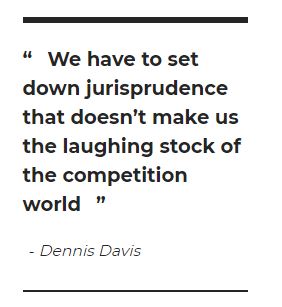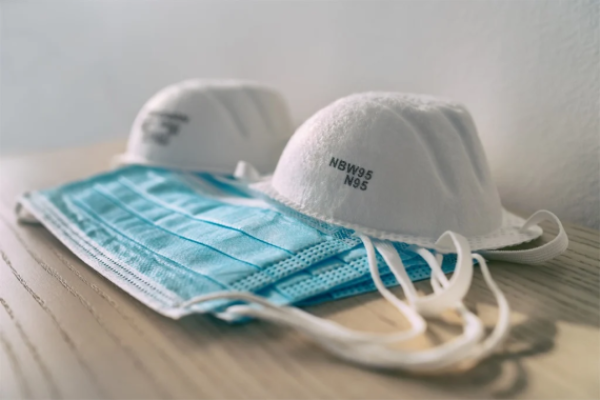The Competition Commission’s case against a small industrial company for excessive pricing of dust masks has raised concerns about overreach and problematic legal precedent
Danie van Niekerk, a small business owner in Pretoria who sells industrial overalls to mines and tanneries, had never heard of the Competition Act. Then his company, Babelegi Industrial Workwear & Supplies, upped the prices of 76 boxes of dust masks by as much as 888% for three weeks in February.
In March, the Competition Commission came calling. In the interests of protecting vulnerable customers during the pandemic, it charged Babelegi with excessive pricing under the Competition Act.
Despite the company’s co-operation, it was referred to the Competition Tribunal over the Easter weekend for prosecution and a fine — without Babelegi’s lawyer being alerted, it emerged in court on Friday.
The commission probably didn’t expect what came next: Babelegi got the backing of a huge pro bono legal team, and has fought the matter all the way to the Competition Appeal Court.
There, on Friday, a flabbergasted judge Dennis Davis described the commission’s case as looking like an "unbelievable rush job" that was "sparse" on facts.
The saga began, as most things in 2020 have, with the coronavirus pandemic.
In March trade, industry & competition minister Ebrahim Patel, concerned that consumers would face high prices for urgent medical goods such as masks or food during the state of disaster, signed a regulation limiting profit margin increases on essential goods. Once that came into effect on March 19, price increases on products such as hand sanitiser had to be justified by an actual increase in suppliers’ costs.
That same month, Competition Commission head Tembinkosi Bonakele warned the commission would protect consumers "who are exploited … at the worst possible time".
The commission went on to charge more than 30 firms with excessive pricing or high profit margins. Most simply paid a fine, often not admitting guilt, under tribunal-approved consent orders.

It’s a charge that’s rarely used — and which has yet to be upheld on appeal in SA. In fact, the only two firms to have faced it are Sasol and Mittal Steel SA (formerly Iscor), both monopolies with apartheid roots.
Babelegi’s legal papers detail many of the "dominant" businesses that paid fines, including: a pharmacy that made a profit of R500 by selling masks at R15 after paying R10 for them; a cosmetics store that sold 563 hand sanitisers for a total revenue of R16,890 at a profit margin of 23.33%; and a pharmacy that sold just 250 bottles of hand sanitiser.
Michelle le Roux, one of the advocates acting for Babelegi, argued that the small profits "suggest the commission is zealously pursuing complaints against small, nondominant firms, and firms that are new entrants into the various markets".
The commission, on the other hand, believes it was protecting the vulnerable from "egregious" price hikes. It argued that international economists have shown that a pandemic can make even a small firm dominant, and thus open to the charge of excessive pricing.
In Babelegi’s case, the hikes were described by a judge as "astronomical", and the explanation for the increases unconvincing. Babelegi said it upped its prices because of a global shortage of dust masks, which meant it would pay high prices in the future.
But what has lawyers worried is the precedent that may be set if a law that’s designed to stop large, dominant firms from excessive pricing is used against small firms.
It could mean, says Babelegi lawyer Danie Jacobs, that small firms’ prices could be regulated by the Competition Act in any state of disaster.
Prof Liberty Mncube, an economist at FTI Consulting, says: "If the commission were to win this case, there is a risk that big and small firms could be guilty of excessive pricing even if they are not dominant or have substantial market power."
While it may be morally outrageous for a small firm to charge high prices during a state of disaster, the concern — raised by Mncube and senior lawyers the FM spoke to — is that the case could set a precedent by which such a firm could be charged under an act reserved for near-monopoly businesses.
A second issue concerns how the law is applied. For the law to be fair, companies have to know it will apply to them, so they can act accordingly.
Senior counsel Greta Engelbrecht, acting for Babelegi, asked the tribunal and Competition Appeal Court whether Van Niekerk could possibly have known in February, before Covid hit SA, that his company would be charged as a dominant firm under a law drawn up for large businesses.
As Van Niekerk tells the FM: "I did not and still today do not understand how I can be prosecuted under this act, as we are an extremely small family business."
Even prior to Covid, excessive pricing was such a difficult charge to prove that the commission had never won such a case at the Competition Appeal Court. As a result, the department of trade & industry last year amended the Competition Act to make it clearer and easier to enforce.
So Babelegi has become the third firm to challenge excessive pricing action at the Competition Appeal Court, and the first to test the amended law.
On Friday, Davis noted the absurdity of the situation: "It is remarkable. It is the first of its kind in a most complicated area of competition law, and we are talking about a small firm that would never have dreamt that the full might of the Competition Commission and all these amici [friends of the court] would be [thrown] at them."
The story of Babelegi — an obscure industrial firm that sold 76 boxes of dust masks to industrial customers — is, it seems, less about the company, and more about SA’s competition watchdog. Was the Competition Commission’s prosecution of firms preventing consumers from being exploited, or was it "political" and bad competition law?
The case at the appeal court turned on whether a small business charged with excessive pricing can be "dominant", as required by the Competition Act. Could a firm with less than 5% of the market have market power in a pandemic or national disaster where supply chains are disrupted and consumers are desperate? Particularly, as in the case of Babelegi, if Covid had not yet even reached SA?
Dominance is usually defined in law as a company acting "appreciably independently of its competitors and consumers" for a durable length of time.
The commission said the pandemic gave companies such as Babelegi temporary market power or dominance, as they could sell masks for very high prices due to unusual demand and unusual shortages.
Davis wanted facts for the commission to prove its case and prove Babelegi was dominant. He wanted to know if there were dust mask shortages in February, and what Babelegi’s competitors were doing at the time.
These facts, however, seemed to be in short supply.
When Davis asked the commission for more details on supply shortages in the face mask market, for example, it offered up news articles as evidence.
Frustrated, Davis said: "This the first major excessive pricing case under [new law changes] after two very difficult, long and complicated ones. Is the best the commission can do [to] put up some two-page photocopy from EWN [Eyewitness News]? Why do we have to rely on newspaper reports, which can be notoriously inaccurate?"
Davis’s impression was that the case was "an unbelievable rush job. Why on earth did it have to be rushed like this?"
He suggested the commission could have taken its time to investigate and build a case against Babelegi, or against bigger firms that sold health goods needed by ordinary consumers, rather than industrial supplies.
"The case takes on a political context rather than dealing with it in the rigid and rigorous way we require," he said, adding: "You can’t just make it up as you go along and chuck out the [Competition] Act."
Article Source: https://www.businesslive.co.za/fm/features/2020-09-10-pandemic-pricing-politics/





